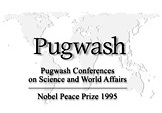Hiroshima Declaration 2025
TMS PEACE JOURNALISM, 10 Nov 2025
Pugwash Council - TRANSCEND Media Service
Issued by the Pugwash Council, 5 November 2025
Eighty years after the atomic bombings of Hiroshima and Nagasaki, humanity once again stands at a decisive moment. The world faces growing confrontation, the weakened role of diplomacy, and the erosion of the norms that have restrained nuclear weapons use. The global order based on the UN Charter and international law is increasingly threatened. Nuclear-armed states are expanding and modernizing their arsenals, the risk of nuclear proliferation is higher, and the “nuclear taboo” is being violated by explicit threats of nuclear attacks. Recent conventional strikes on nuclear facilities are a clear violation of the commitment on prohibition of attack or threat of attack on safeguarded nuclear facilities. The targeted killing of scientists and engineers further undermines international laws. The Doomsday Clock now stands at 89 symbolic seconds to midnight, its closest ever, a stark warning that nuclear dangers are intensifying.
From Hiroshima, we affirm with conviction that nuclear weapons must never be used again, under any circumstances, since a nuclear war would destroy not only nations but the future of humankind itself. The bombings of Hiroshima and Nagasaki were not only tragedies of war but represent enduring moral ruptures in the conscience of humankind.
If such a future is to be averted, dialogue must replace confrontation. The Pugwash movement was founded on “dialogue across divides,” and history shows that even in times of deep hostility, such dialogue has made disarmament possible. As the 2010 New Strategic Arms Reduction Treaty nears expiration in 2026, renewed U.S.–Russia engagement is essential and must extend to all nuclear-armed states. Confidence-building measures, regional cooperation, and responsible management of emerging technologies must follow. The upcoming Non-Proliferation Treaty and Treaty on the Prohibition of Nuclear Weapons (TPNW) review conferences offer crucial opportunities to restore trust and place disarmament back at the core of international security. And every effort has to be devoted to ensuring the entry into force of the Comprehensive Test Ban Treaty. Nations must reaffirm and strengthen the principles and obligations of the Outer Space Treaty to prevent weaponization of the space environment.
True peace cannot rest on the threat of annihilation posed by nuclear deterrence policies, which offer no real security. Eliminating reliance on nuclear weapons is both a moral duty and a strategic necessity. States should adopt No-First-Use policies, give unconditional Negative Security Assurances to non-nuclear armed states, and strengthen frameworks of cooperative and common security. Initiatives such as Nuclear-Weapon-Free Zones show that disarmament is achievable through trust and cooperation.
Scientists and scholars share a special responsibility to guide leaders with knowledge, scientific rationale and ethical judgment. The scientific community must strengthen the work of the TPNW Scientific Advisory Group and the UN Scientific Panel on the Effects of Nuclear War, and act decisively to address the destabilizing risks of new technologies like Artificial Intelligence, quantum and biotechnologies.
In addition, civil society remains a moral force for peace. The Nobel-recognized efforts of Pugwash, ICAN, IPPNW, and Nihon Hidankyo demonstrate that citizens and scientists can awaken conscience and shape the future. Their message, echoing across generations, remains our compass: No more Hiroshimas. No more Nagasakis. No more war. Japan’s Constitution, Article 9, which renounces war and the use of force, echoes the 1955 Russell–Einstein Manifesto’s appeal to abolish war itself. Together, they stand as enduring beacons of conscience, affirming that true security lies not in arms and the use of violence, but in multilateralism, respect for rule of law, justice, dialogue, and our shared humanity.
Let the Pugwash Conference in Hiroshima 2025 be a turning point towards dialogue, disarmament, and lasting peace for all humankind, guided by the unyielding call of the Russell-Einstein Manifesto: “Remember your humanity, and forget the rest.”
Adopted (by correspondence) by the Pugwash Council on the occasion of the 63rd Pugwash Conferences on Science and World Affairs, Hiroshima
Tags: Atomic Weapons, Hiroshima and Nagasaki, Nuclear Weapons, Pugwash Council
This article originally appeared on Transcend Media Service (TMS) on 10 Nov 2025.
Anticopyright: Editorials and articles originated on TMS may be freely reprinted, disseminated, translated and used as background material, provided an acknowledgement and link to the source, TMS: Hiroshima Declaration 2025, is included. Thank you.
If you enjoyed this article, please donate to TMS to join the growing list of TMS Supporters.

This work is licensed under a CC BY-NC 4.0 License.
Join the discussion!
We welcome debate and dissent, but personal — ad hominem — attacks (on authors, other users or any individual), abuse and defamatory language will not be tolerated. Nor will we tolerate attempts to deliberately disrupt discussions. We aim to maintain an inviting space to focus on intelligent interactions and debates.
Read more
Click here to go to the current weekly digest or pick another article:
TMS PEACE JOURNALISM:
